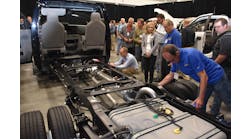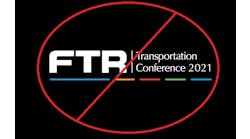Under normal circumstances, it’s essential for most people to get up every day and go to work to provide for their families—to pay the mortgage, put food on the table, heat and cool their homes, and pay the bills in general. But these are anything but normal circumstances. Many of these same people who go to jobs every day are not only essential to their families, but also to the safety and well-being of the entire country. They have a different sense of purpose, and that mission now has taken on a national urgency.
“We are supporting the medical field, so our work is always important,” says Kevin Grayson, beverage/EV production manager for Mickey Truck Bodies, which supplies Jefferson NC-based American Emergency Vehicles/REV Group with the aluminum bodies that are upfitted into full-service ambulances. “But we’re putting a little more heart into it these days. We make sure we hit our schedule and put out a high-quality body so that when AEV gets it, they can turn it into an ambulance and get it to the front lines. Our manufacturing goal is to always ‘get it right the first time’ to avoid rework. That’s more important than ever.”
Indeed, people want to “serve a greater purpose,” adds Michelle Kirk, delivery coordinator for AEV.
“We know what we are coming in here to do,” Kirk says. “Patients need to get to hospitals, and we want to help. It’s human nature. We take pride in the work we are doing.”
Both AEV and Mickey have always taken an “employee-first” approach to their businesses, and they are taking all steps necessary to keep their teammates safe during the COVID-19 medical crisis by complying with federal, national and local safety guidelines.
Mark Milam, a Mickey welder and 25-year company veteran, explains that he still comes to work every day as he always has, “only now it’s not just about feeding my family.”
“We’re in a pandemic, we are working to save lives,” Milam says. “I’ve always been proud of what I do. Now, when my kids see an ambulance on the road, and ask, ‘Daddy, did you help build that ambulance?’ I feel even better when I tell them I did. I can always tell a Mickey body.”
To help mitigate against the spread of coronavirus in the workplace, Mickey has reduced its hours by giving plant employees three days off per week. At the same time, the company has trained additional employees to work on ambulance bodies in order to keep pace with AEV’s production.
“A smart move,” says Mickey’s Grayson. “It boosts morale by giving us more time at home with our families, and allows us to come back to work rested and able to focus on doing quality work. While we’re here we’re very conscientious about keeping ourselves and our teammates safe. We’re taking all the precautions because we want to come to work to do our part to heal the country.”
Production of ambulance bodies has not slipped under the revised work week, the company reports.
“I’m a germaphobe to begin with,” says Milam, the Mickey welder. “I keep my timecard in my wallet now instead of at the clock. I wipe down my computer [keyboard] before and after I use it. I don’t drink from water coolers. My head is in a welding helmet 80% of the day. I know I’m safe when I’m at work, so my focus is on the job. Coming to work doesn’t bother me. Not coming to work, especially in these times, is what would really bother me.”
And AEV, Mickey’s customer, appreciates the effort.
“I am very proud of the work that the team at American Emergency Vehicles does every day, particularly as we all manage through the complexities of the COVID-19 crisis,” said Randy Hanson, vice president and general manager of AEV/REV Group. “We recently fulfilled an order for 43 ambulances for New York City, and our strong relationship with Mickey Truck Bodies was part of the reason we could respond quickly and confidently to support those on the front lines.”








